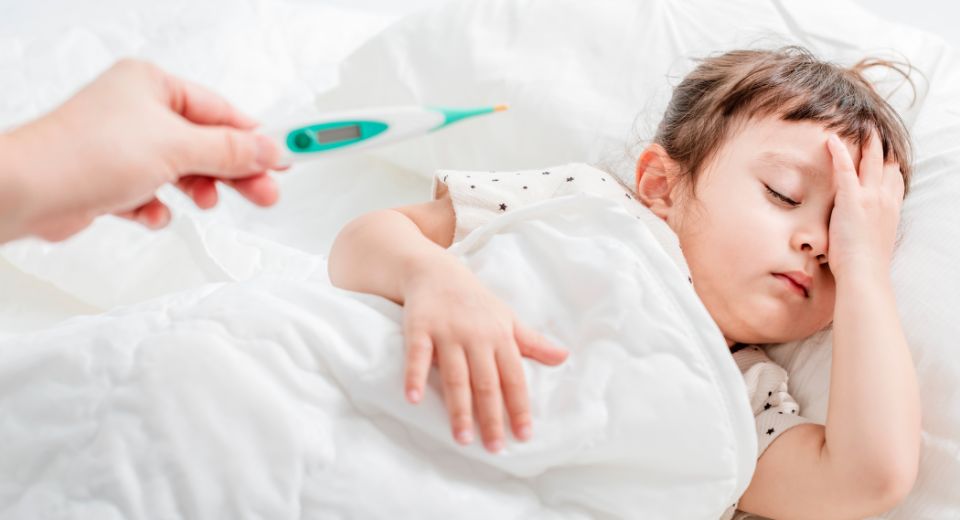Author: Marque Family Pediatrician
The goal for caring for your child’s cold or flu is to make your child comfortable. Antibiotics may be used to combat bacterial infections, but they have no effect on viruses. Make sure your child gets extra rest and drinks lots of fluids. Your doctor may want to see your child or ask you to watch him or her closely and report back if there is no daily improvement or a full recovery after one week.
To Relieve a Stuffy Nose:
Nose drops or spray
- Use saltwater (saline) nose drops (1 to 2 drops in each nostril) or spray (1 to 2 sprays in each nostril). For infants, use a rubber suction bulb to suck out the extra drops or spray. When using the suction bulb, remember to squeeze the bulb part of the syringe first, gently stick the rubber tip into one nostril, and then slowly release the bulb. This slight amount of suction will draw the clogged mucus out of the nose and should allow her to breathe and suck at the same time once again. You’ll find that this technique works best when your baby is under 6 months of age. As your baby gets older, he or she will fight the bulb, making it difficult to suction the mucus, but the saline drops will still be effective.
Humidifier
- Place a cool-mist humidifier (vaporizer) in your child’s room to help keep nasal secretions more liquid and make your child more comfortable. Set it close to your child (but safely beyond reach) so that he or she gets the full benefit of the additional moisture. Be sure to clean and dry the humidifier thoroughly each day to prevent bacterial or mold contamination. Hot-water vaporizers are not recommended since they can cause serious scalds or burns.
To Relieve a Cough:
Honey
- Do not give honey to babies under one year—it is not safe.
- For children ages 1 to 5 years: Try half a teaspoon of honey.
- For children ages 6 to 11: Try one teaspoon of honey.
- For children 12 or older: Try two teaspoons of honey.
- If honey is given at bedtime, make sure your child’s teeth are brushed afterward.
Cough drops or lozenges
- Consider cough drops or lozenges for children 4 and older. Do not give cough drops or lozenges to a child younger than 4 years because he could choke on them. Also do not give your child more cough drops than directed on the package.
To Relieve a Fever:
Acetaminophen or Ibuprofen
- If your child has a fever and is very uncomfortable, give a single ingredient: acetaminophen or ibuprofen. Call your doctor before giving medicine to a child under 2 years of age, and call right away if your child is under three months of age and has a fever.
- Ibuprofen is approved for use in children 6 months of age and older; however, it should never be given to children who are dehydrated or who are vomiting repeatedly.
- Do not give your child aspirin, which has been linked with Reye syndrome, a rare but very serious illness that affects the liver and the brain.
- Always measure each dose using a device (syringe, dosing cup, or distinctly marked measuring spoon) that is marked in milliliters.
Prevention & Treatment:
Flu vaccine
- Children 6 months or older should get a flu vaccine each year. Children who are older than 6 months but younger than 2 years should get a flu shot.
- Children younger than 6 months are too young to get flu vaccines. In order to protect them, make sure the people around them get a flu vaccine.
Over-the-counter cough & cold medicines
- Over-the-counter (OTC) cough and cold medicines should not be given to infants and children under 4 years of age because of the risk of life-threatening side effects. Several studies show that cold and cough products don’t work in children younger than 6 years and can have potentially serious side effects.
- Many cold medicines already have acetaminophen (Tylenol or generic) in them. If you give one of these medicines along with acetaminophen or (Tylenol or generic), your child will get a double dose.
- Children should NOT take cough medicine with codeine.
If antibiotics are prescribed
- Make sure children take them exactly as directed, even if they feel better. If antibiotic treatment stops too soon, the infection may get worse or spread in the body. Call the doctor if your child is not getting better with treatment.
The information provided is for general interest only and should not be misconstrued as a diagnosis, prognosis, or treatment recommendation. This information does not in any way constitute the practice of medicine, or any other health care profession. Readers are directed to consult their health care provider regarding their specific health situation. Marque Medical is not liable for any action taken by a reader based upon this information.

